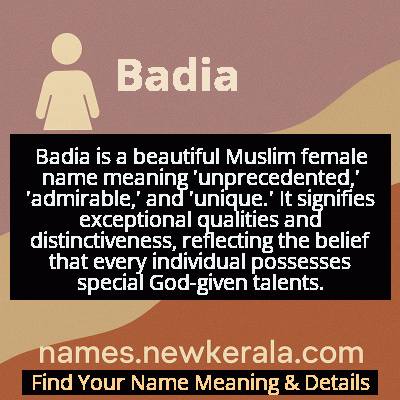Badia Name Meaning & Details
Origin, Popularity, Numerology Analysis & Name Meaning of Badia
Discover the origin, meaning, and cultural significance of the name BADIA. Delve into its historical roots and explore the lasting impact it has had on communities and traditions.
Name
Badia
Gender
Female
Origin
Muslim
Lucky Number
8
Meaning of the Name - Badia
Badia is a beautiful Muslim female name meaning 'unprecedented,' 'admirable,' and 'unique.' It signifies exceptional qualities and distinctiveness, reflecting the belief that every individual possesses special God-given talents.
Badia - Complete Numerology Analysis
Your Numerology Number
Based on Pythagorean Numerology System
Ruling Planet
Saturn
Positive Nature
Ambitious, efficient, realistic, and authoritative.
Negative Traits
Materialistic, stressed, confrontational, and can be overly ambitious.
Lucky Colours
Dark blue, black.
Lucky Days
Saturday.
Lucky Stones
Blue sapphire, amethyst.
Harmony Numbers
2, 4, 6.
Best Suited Professions
Business leaders, managers, financial services, law enforcement.
What People Like About You
Leadership, determination, organizational skills.
Famous People Named Badia
Badia Masabni
Dancer and Nightclub Owner
Pioneer of modern belly dance who established famous Cairo nightclubs and trained legendary dancers
Badia Hadj Nasser
Algerian Singer
Renowned Algerian vocalist known for preserving and popularizing traditional Algerian music
Badiaa Bouhrizi
Tunisian Musician
Electronic musician and activist known for blending traditional Tunisian sounds with modern electronic music
Badia Sahar Agha
Pakistani Actress
Prominent television actress known for her roles in popular Pakistani drama series
Name Variations & International Equivalents
Click on blue names to explore their detailed meanings. Gray names with will be available soon.
Cultural & Historical Significance
In contemporary Muslim societies, Badia represents a bridge between traditional values and modern individuality. The name carries connotations of cultural pride while embracing progressive ideals of female empowerment and creative expression. It symbolizes the balance between maintaining cultural heritage and encouraging personal distinction, making it a meaningful choice for parents seeking a name that honors tradition while celebrating uniqueness.
The name's cultural resonance extends beyond its literal meaning, serving as a reminder of the value Islam places on diversity within unity. It reflects the Islamic principle that each person is created with unique capabilities and purposes, encouraging bearers of the name to develop their distinctive talents while contributing positively to their communities.
Extended Personality Analysis
Women named Badia typically exhibit strong independent thinking and creative problem-solving abilities. They often possess natural leadership qualities combined with artistic sensibilities, making them innovative in their approach to both professional and personal challenges. Their unprecedented nature manifests as original thinking and the ability to see solutions where others see obstacles, earning them admiration from peers and colleagues.
Badia's personality is characterized by a unique blend of confidence and compassion. They tend to be trailblazers who aren't afraid to stand out from the crowd, yet they maintain deep connections with their cultural roots and community. Their admirable qualities include resilience in the face of adversity and the ability to inspire others through their distinctive perspective and unwavering authenticity. They often excel in fields requiring both creativity and strategic thinking.
In interpersonal relationships, Badias are known for their loyalty and the unique perspectives they bring to friendships and family dynamics. They balance their strong individuality with deep emotional intelligence, making them both inspiring leaders and compassionate companions. Their unique approach to life often makes them catalysts for positive change in their communities.
Modern Usage & Popularity
In contemporary times, Badia maintains steady popularity in Muslim communities worldwide, particularly among families seeking names that blend traditional roots with modern appeal. The name has seen consistent usage across Arabic-speaking countries and Muslim diaspora communities in Europe and North America. While not among the most common names, its usage reflects a preference for distinctive yet culturally meaningful names. Recent trends show increased adoption by educated, urban families who appreciate its connotations of individuality and strength while maintaining cultural authenticity. The name's moderate popularity ensures it remains recognizable without becoming overly common, preserving its unique character across generations.
Symbolic & Spiritual Meanings
Symbolically, Badia represents the concept of divine uniqueness and individual purpose. The name embodies the idea that each person carries unprecedented qualities that contribute to the diversity of human experience. It symbolizes the beauty of standing out while remaining grounded in cultural identity, serving as a metaphor for the balance between individuality and community. The name also carries connotations of natural leadership and the courage to pioneer new paths, representing the human capacity for innovation and distinctive contribution to society. In a broader sense, Badia symbolizes the Islamic value of appreciating diversity as a sign of God's creative power and the importance of each individual's unique role in the collective human journey.

